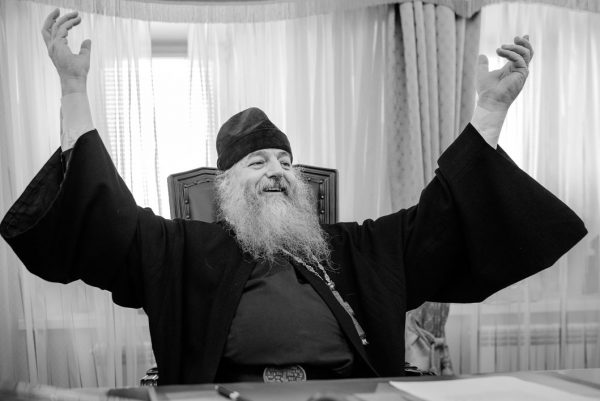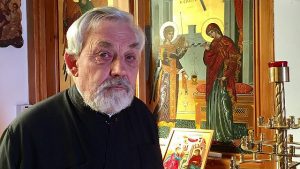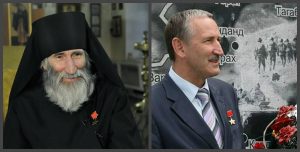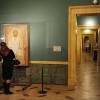“How many cups of coffee should I bring,” asked the Nun. “Ten,” replied Father Vasilii. “There’s six people present, plus their Guardian Angels…” He always mixes in a bit of humour with higher truths, so you never know, when he is joking, and when he’s a visionary. Father Vasilii Pasquier, Abbot of the Holy Trinity Male Monastery in the city of Cheboksary, is a Russian and Chuvash Frenchman who has now lived in Russia for twenty-two years.
Walking barefoot towards God
How was it that you ended up in Russia in the first place? After all, people in Europe tend to look at Russia as an old-fashioned, backward, undeveloped place…
Fr. Vasilii Pasquier: What, is Russia a savage country now? Come on! Russia is a great country. Rather, the West is savage, they don’t call it “Wild West” for nothing, especially now, when people there are beginning to forget their Christian roots. This forgetfulness will produce decay. As for Russia… They thought its end had come in the nineties, but as they say, grass that was weeded had put down deep roots…
Does that mean that you did not struggle in your choice?
It’s just that the Lord suddenly pushed me to Russia. The Orthodox faith brought me here.
And when did you realize you would turn to Orthodoxy?
I grew up in a Catholic family. When I was fifteen, I went through a crisis – it could not be avoided – I was interested in playing soccer, not in attending church. Now, imagine a French village in Vendée and, in its centre, a church with tall, very beautiful bell towers. Every fifteen minutes the bells ring. There was a special toll for the early service, another toll for the later service, there were different tolls for marriages and baptisms. In front of the church, there is a place where men gather before the service, because, in those days, everyone attended services… After the service, everyone went to the bistro to talk, including the priest. By the way, talking to people after the service is not at all a bad way of ministering for a priest. There were, obviously, those who headed straight for the bistro – soccer players, people who gamble at the races. And I remember standing in that square at fifteen asking myself, where should I go? And at one point I had turned “left,” I thought I had chosen soccer. Yet, on that day I still went to church. And, do you know something, it turned out to be SUCH a day! Pascha, stained-glass windows shone in the sun, bright light, Paschal hymns… After that, that was it, I stayed in church. I started attending services even when nobody else went. On weekdays after school. Those services, of course, were different from our Orthodox services, they were very “dry,” half an hour and that’s it. It was even getting a bit boring – it was only me and an old lady. Then I began reading your Russian books on theology. And walking around barefoot. Even in winter.
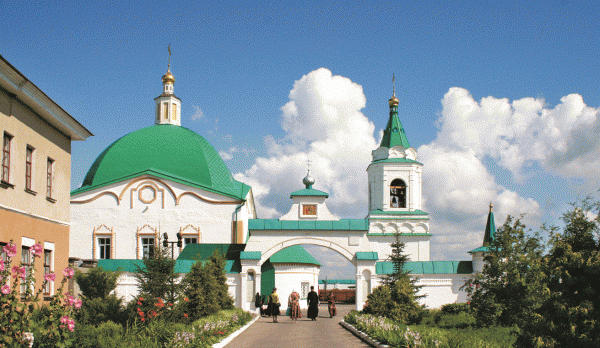
The Holy Trinity Male Monastery in the city of Cheboksary
Were you trying to be an ascetic?
Well, I don’t know, a young man feels it’s important to stand out from the crowd. That’s how I stood out. I went to a Catholic school of course, run by nuns, the moral upbringing was taken care of. But there was still a thirst for theology. After graduation, I worked for a bit, bought a backpack and a tent with my first earnings, said good-bye to the family, and went south. There I ended up in my future monastery, which at the time was still a Christian community. We lived together as a family, sharing our earnings.
How did your family react to all of this?
My father was very critical. He considered it all a gamble, was certain I wouldn’t be able to handle it, and did not come to my tonsure. But my sister, who raised us after the passing of my mother, came, she supported me.
The priest in our community was Catholic, but he had studied in university in Saloniki, so we served by the Eastern rite… And when we founded our monastery, we found our canonical refuge with the Greek Catholics. They are different from the Ukrainian Uniates, they are Jerusalem Greek Catholics, the Melkite Church. We were accepted as a French community and were partially released from the Roman jurisdiction. We did not want to be under it.
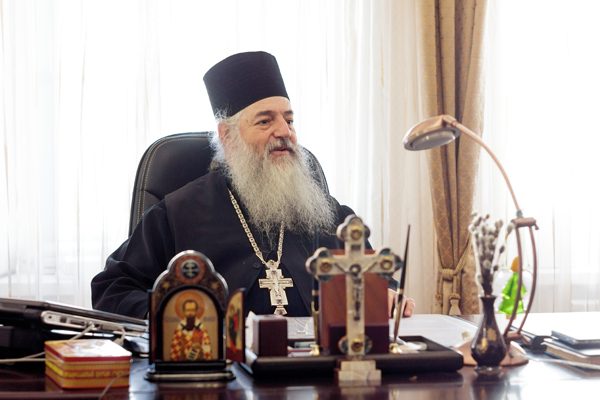
Because of the nature of the administration?
I would say for theological reasons as well. So, there I was, a Catholic of the Eastern rite, living in Jerusalem, in the Holy Land, reading Orthodox books, written primarily by members of the Russian intelligentsia that had left for the West, by Evdokimov, Lossky, Berdiaev. And reading them I came to the conclusion that true faith was there, in Orthodoxy.
The Russians Are Coming
And then, in the nineties, there was a huge influx of emigres from Russia to Jerusalem, over half a million people in half a year. People started speaking Russian everywhere, in the shops the price tags were in Russian, Russian newspapers were published. Every Sabbath many “Russians” started visiting our monastery, those who had not adapted to the Jewish Orthodox rules but wanted to understand their new country. Our monastery (according to tradition, St. John the Baptist and his mother were hiding there from persecutions) is in a unique oasis, there is water, a pool, there are birds. The “Russians” liked it there. And, despite having left it themselves, all of them with one accord kept repeating, “Father Vasily, you have to go to Russia. You will fit right it.”
The curious emigres were succeeded by pilgrims from Russia. White bishop’s cowls started appearing. That’s where I met the future Patriarch Alexii II, in those days still Metropolitan of Leningrad. And in 1992, I met Father Ieronim [Archimandrite Ieronim Shurygin (1952-2013), Abbot of the Holy Trinity Monastery in the town of Alatyr, a well-known spiritual and experienced Elder Hieromonk, who guided many faithful who came to him with their sorrows, including the author of this interview. Editor’s note]. He arrived as a pilgrim as part of a monastic delegation from the Mount of Athos. The Catholics were already celebrating Pascha, and it was Holy Week for the Orthodox. So, as Guestmaster, I served him traditional Eastern delicacies – fruits and tea. Father Ieronim, young, thin, and snub-nosed, was trying to speak French to me, having studied it at school… The only thing I remember is, “shche-shche-shche.” There was something unusual about his appearance. And I did find something unusual about him. Something interesting.
And then I ended up at the Orthodox Paschal Service at the church of the Holy Sepulchre in Jerusalem. And that’s how I began to lead a double life: one was physical, as I lived in a Greek Catholic monastery, while the other was the life of the heart and the mind in Orthodoxy. I always attended Orthodox services. My superiors allowed me provided I also attended our service at five in the morning. So, on Saturday evenings, after eight, when Sabbath finishes and buses start running I would get to Jerusalem, wait until they opened the church of the Holy Sepulchre at midnight, stay there till the service finished at three, then head back. Sometimes I had to walk fifteen kilometres on foot. The nuns from the Russian Convent in Ein Kerem, who already knew me well and liked me, gave me a lift whenever they had room in their car…
In addition, I soon became some sort of a missionary to the “Russian” Israelites that visited us. Once, a very young family arrived. The husband was from Perm, a very intelligent Jew, while the wife was from the South, from Kuban. And he says to me, my wife is Orthodox and she’s baptized, but she doesn’t go to church. And so, I thought to myself, “Thank you for this information, I will start working with her now.” Natasha, I told her, come, I’ll take you with me to the Orthodox service on Pascha… So, I took her with me. Then, during the service, I told her, go up to a priest and have confession. The priest took her confession and, though she had not fasted, allowed her to commune, for that is permitted in special circumstances. She came back after having Communion and there was this aura around her. Her husband did not sleep at all that night. He knew we were in church, but he did not expect the service to be that long. I walked her home, as our monastery was nearby… Natasha was so happy, so joyful! Her talented husband could not find himself in Israel, so they moved to Italy, and then on to the USA following a dream of his. He was a big fan of the young Clinton, which I found very amusing. They settled down there more or less, then Natasha gave birth to a son and died. It happened recently.
Was there a conflict brewing in the community?
When our brothers and the Abbot started to sense they were losing me, they tried to prevent me from going to Jerusalem and from communicating with the Orthodox. So, I went to Father Ieronim, and he told me he could do nothing for me there, but next year he was going back to Russia and would take me with him.
What can you do, I thought to myself, I’ll have to wait. But this double life was becoming more and more unbearable. At the moment, the community was going through a crisis, because the Abbot was under a lot of pressure from Rome to renounce the Eastern rite. I said, “No way!” and once, when it got really bad, I realized I couldn’t take it anymore. I went to Ein Kerem, where Father Ieronim served. He said, well, alright, if you’ve come to a decision, we’ll go see the Patriarch tomorrow. Patriarch Diodor approved my choice. But, in order to avoid conflicts with other confessions, for after all Jerusalem is a small city, he said, it’s better to go straight THERE, to Russian Orthodoxy.
The Secretary of the Mission of the Russian Orthodox Church in Jerusalem Hieromonk Mark (who is now Archbishop of Egorievsk) personally translated and took my request to be transferred to ROC to Moscow. At the time, Father Ieronim and I were busy cleaning the sewer and fixing the roof for Mother Georgia in Ein Kerem, basically doing everything women couldn’t do. I never had a problem with hard or dirty labour, neither did Father Ieronim.
The answer from Moscow came, but upon learning that the request had been forwarded without his knowledge, the Head of the Mission, Metropolitan Theodosii got really angry and shelved it. Everything was left in limbo.
What could I do? I didn’t have money enough to buy a ticket to Moscow. So, I ran off to France to look for a job. My brother, who restores old furniture, took me on, as he happened to have a lot of orders before Christmas. My father said, “I knew it all along!” So, I said to him, “Dad, I’m not coming back to the world, but moving to Russia.” “Whaaaaaaat?!” “I’m going to convert to Orthodoxy.” Remember, it was October of 1993, there were reports of Russian anarchy on TV.
One-way ticket
So, there I was, restoring furniture, but there still was no reply from Russia. Vladyka Gurii, the Representative of the Moscow Patriarchate in France, was a man with a Soviet attitude to things, he tried to avoid problems and visitors. I always got the answering machine on his phone requesting to leave my details and promising to call back. Well, obviously, if they thought it would be worth calling back. In the end, I found his apartment, availed myself of somebody walking out of the building and went inside. I met Vladyka and a Hierodeacon in their civvies carrying up the stairs a huge television set they had bought somewhere in Italy. I explained that I wanted to become Orthodox and that I had written to the Patriarch. Vladyka Gurii laughed in my face, “What, you want to have a meeting with the Patriarch himself?!” and advised me to first go to Russia as a tourist on a return ticket. I was offended, “If I buy a ticket, it will only be one-way! And I have to see the Patriarch.” He laughed again, so I asked him, “What if it’s from God?”
So, I bought a one-way ticket and left for Russia.
Some people I knew in Jerusalem had introduced me to Father Georgii Kochetkov. His people met me in Sheremetievo, took me to an awful room with old linoleum and cockroaches, set me up on a camp bed. I didn’t like the atmosphere in Father Georgii’s church, it seemed “charismatic” to me, so I thought, “Could it be that I ended up in place I had actually been trying to escape?” Basically, I felt extremely uncomfortable. I rang a friend, and she said to me, “Father Vasilii, leave that place at once!”
She was a conductor in the church of St. Nicholas in Pyzhy, where Father Alexander Shchargunov served. Father Alexander spoke fluent French, so everything turned out alright.
However, everyone, Father Ioann Krestiankin, Father Nikolai from the island of Zalita, and Blessed Lubochka (I met all of them during my first months in Russia) kept telling me that I had to see the Patriarch himself. When Father Ioann Krestiankin gave me his blessing, he actually said to the student who was with me, go visit the Patriarch on the day of his enthronement and tell him you brought him a gift from me. We were on the way to that service and I kept saying to the student, “Don’t forget to tell him about the ‘gift’.” Everything went well. His Holiness read the letter attentively and made arrangements for my transfer. Soon, I saw Vladyka Gurii at a service in the church of the Kazan Icon in Red Square and said to him, this is not the first time I serve with the Patriarch himself.
How did you end up in Chuvashia?
At first, I was under monastic obedience in the Pscov-Caves Monastery and waited for Father Ieronim. Then, one time, he told me, “I’ll take you with me…” He came to get me, and we went to see His Holiness to request my transfer to Chuvashia, because we had both known Vladyka Varnava well since our Holy Land days. His Holiness approved the transfer of Father Ieronim and then asked me, “What about you?” And the only thing I knew how to say in Russian was, “the same as him.”
Sins on a piece of paper
You have a lot of pastoral experience. You have served in a monastery, in a village church and in the city, in the twentieth and twenty-first centuries. Does a person’s spiritual life change?
The most important phenomenon that takes place these days is people coming to the realization that we have to seek God and spiritual life. And church, we have to go to church, because that is where you can meet God.
As for other things, what else can change? Sins remain the same. And people remain the same. Though often they come to the realization of their sins, and that is a big change. People often don’t understand much about sins. It is not easy to understand one’s sins. These days many come to confession with lists of sins thiiiiiiis long. I don’t even try to make out what is written there. I tell them, all these “sins of yours on this piece of paper” are like trees that don’t let you see the forest, so, forget about them. Come on, tell me about yourself. We often try to fool ourselves in confession with these paper enumerations. We don’t write down what is most important. I often see people covering up the most important sin with little-tiny ones. And I go, poof-poof-poof, and blow away the cover-up. And there you have it, there’s your sin. If people are heading towards God, to Church, I must help those who come to see themselves.
Do you have a favourite French or Russian saying?
I often say both in French and in Russian, “everything is relative.” Only God is Absolute. Especially, when I see peremptory people.
All human rules are relative. God gave them to us not for their own sake, but to help us improve. Oh, those rules, rules! Priests are always trying to impose penances on modern-day people as if it were the fourth century. I keep saying, when St. Basil the Great wrote these rules, the world was different. He didn’t know what the internet was, what a plane was… Already in the eighth and ninth century, St. Theodore the Studite offered to excommunicate sinners for a different length of time than St. Basil the Great, because times had changed. It would be good for us to take all this into account. Of course, we shouldn’t act as members of the Reformation, phew, and everything’s wiped away. What we have to do, is consider what applies to each individual person keeping the old rules in mind. We must wisely follow old traditions, without forgetting them. There has to be discernment in everything.
Father, tell us one more thing before we wrap up.
Recently, we celebrated the feast of a great Russian saint, whose life I had read forty years ago in French, St. Seraphim of Sarov. He said, that the aim of a Christian life is to acquire the Grace of the Holy Spirit. And, I think, that is the thread that needs to go through our entire life. Not following rules, but this.
One of the desert fathers, being asked about the fear of God before he died, replied, “I no longer fear God – I love Him.” Fear begets fear of the rule, of the law, while love frees from them. Love knows no rules. And love has to go through our life like a red thread. So, how do you like your wine?
It’s strong…
What do you mean, strong? Coca Cola is stronger…
Come and visit us again.
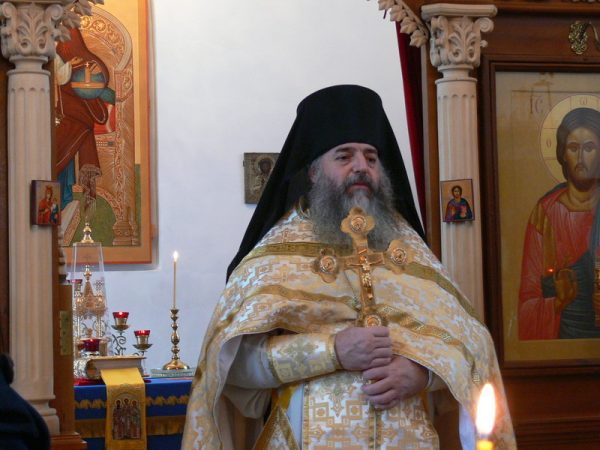
Photo: http://www.pravoslavie.ru
In Father Vasilii’s own words
French experience in Alatyr
Church-going ladies in Alatyr had this way of going to a male monastery and asking a priest to divorce them from their husbands. Because, he, apparently is a drunkard, doesn’t understand a thing, and prevents her from obeying church rules. And, most important, since according to the rules of lent, there should be physical abstinence from the husband, these ladies demanded abstinence from their unbelieving husbands. Who, obviously, disagreed. So, she says to me in confession, “It’s impossible! He forces me to sin!” So, I tell her, “So what?! Be patient, he is, after all, your husband and has a right to it. Read what St. Paul says, abstinence should be based on agreement. If your husband is not church-going, be patient, pray for him and remember, the husband is still the head of the family. Obviously, it is a sin. So, what, repent, ask the priest for a penance, there’s no point in getting a divorce.” She doesn’t stop there, “He makes a scene every time he gets drunk.” So, I tell her, “Are you sure it’s not the other way around?” A Christian woman ought not to shout at her husband if he comes home drunk. You women are, after all, smart, don’t you get it, there’s no point in shouting – he’ll start shouting back at you. God forbid, he may even hit you. Better act like this, “Oh, you poor thing, you look so tired, go lie down on the couch…” Let him sleep it off and in the morning, give him some pickle brine (traditional Russian remedy for a hangover. Translator’s note). Show him you understand that he’s not feeling well. And his attitude towards you will change completely. He will be amazed, wow, look at my wife! And he’ll ask himself, what is this power that gives her so much patience? And so, little by little, he may also come to your faith. And if you wait for him with a stick to beat him up, he will also ask himself, what kind of faith is this? People get divorced because of infidelity, when a husband leaves you for another. But when a husband drinks, there’s no point. Patience is what you need. A faithful wife will save an unbelieving husband.
Meanwhile
Father Vasilii Pasquier’s younger brother founded an Orthodox parish in his homeland. In 2006, he visited his brother in Chuvashia with his family of six. A few months after his return to France he became Orthodox. “He found some unused premises next to a Catholic church, put up an iconostasis, a table, and now an Orthodox priest comes from Paris once a month to serve Liturgy,” says Father Vasilii. “When he gets sick though, the service is cancelled, though the people travel for sixty to one hundred kilometres to get there, not from the next suburb. It’s not easy being Orthodox in the West, especially, when you don’t have a church of your own.”
Translated from the Russian by Maria Nekipelov












